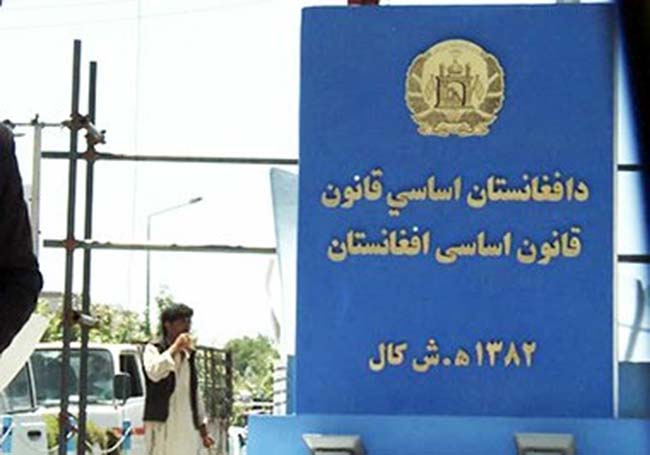A study by Afghanistan’s Freedom House has found that the Afghan constitution has been persistently violated by all the three main branches of the state during past over a decade. According to the study, there have occurred more than 92 instances of violation of the constitution in recent years with the executive body particularly the presidential palace responsible for most of the violations. Afghanistan’s Freedom House says the violations occurring over past 13 years span 161 of the total 162 articles of the country’s constitution. Reacting to the report, a presidential spokesman has said that most of the violations relate to the former administrations, insisting that the government is responsible for implementation of the constitution and that the President is committed to safeguard the constitution. The study is coming as specifically piercing for the government as the highest executive entity in the country that has long been accused of negligence towards preserving and implementation of the constitution.
The study reveals the extent of the violation of laws by the government and members of the country’s parliament and judiciary and outlines major instances of violations of the constitution committed by the main state bodies since it was established thirteen years ago. What is particularly glaring in the report is that most of the violations of the law is attributed to Afghanistan’s former and current governments particularly the country’s successive presidents. Instances such as failing to hold parliamentary and presidential elections in time, instating officials as acting ministers beyond the period set in the law and refusing to sign into laws the bills passed by the parliament are named as notable cases of violation of the constitution by the former and serving presidents of Afghanistan. The study has criticized the government for deliberately blocking enactment or implementation of laws passed or in the process of being enacted in the parliament. The report also blames the parliament and the judiciary for repeatedly violating the constitution by acting beyond their legal mandates.
The study echoes calls on the government to do more to safeguard the constitution and promote rule of law in the country. The government has been under criticisms from observes and independent entities for being the first to violate the existing laws and lacking the resolve to prevent day-to-day violation of laws by government officials, warlords, local strongmen and irresponsible groups. The study highlights the extent of violation of the country’s constitution while culture of violating laws has become deeply rooted in the Afghan politics. The problem is deeply cultivated in the Afghan society, and the government’s lack of resolve only compounds the problem. There is a broad sense of impunity from legal prosecution from among high-ranking officials to the lower officials in the public and government offices. Officials and public representatives goes corrupt and violate laws with complete sense of immunity from legal action and have the assumption that no one would come after them.
Lack of resolve to respect and protect the laws and the prevalent culture of impunity existing in the country has left the government unable to promote and extend rule of law. The government’s failure to pursue perpetrators of human rights violations and bring them to justice has long been criticized. Recently the global rights advocacy group Human Rights Watch asked the Afghan government to end the culture of impunity that remains prevalent in the country and let the perpetrators of human rights violations unpunished. However, little has been done by the government to ensure the laws are enforced and those who violate human rights violations are pursued and punished.
The problem of violating laws is a chronic challenge in the country. Afghan political elite is rarely committed to principals of rule of law, good governance and transparency. Corruption and power struggle through undemocratic means are norms and is the dominant political culture in Afghanistan. The national unity government came to power with the promise to promote rule of law and end phenomena such as corruption, lack of accountability, impunity and violation of laws. However, it stucked in a cycle of inefficient administration and power struggle going through day to day violation of laws. The government is continuing to administer many affairs in contrary to the terms of laws. The internal problems have left the national unity government unable to prevent and resolve administrative and legal stalemates over the appointments of government officials and activities of key executive and independent bodies.
The government needs to realize its responsibility in promoting good governance, rule of law, accountability and transparency. These are made through years and decades of commitment by the government and the political elite. Afghanistan has long suffered chaos and anarchism. It is time for the government to take immediate actions indicating its own commitment to the laws and boosting enforcement of law in the country. In order to begin, the government needs to remain committed to enforce the laws particularly constitution including by highest officials in the government. There have been lots of efforts to strengthen law enforcement agencies. However, when the political elite refuses to safeguard the constitution, the state-building efforts and the measures to promote rule of law would go nowhere.
The report published by Afghanistan’s Freedom House and other reports putting Afghanistan in the bottom in some key global rankings should come as wake-up calls for the Afghan government and the elite political class in the country. The Afghan government needs to take concrete measures to prove it is committed to safeguard the constitution and ensure that the laws are enforced by not only the public but also the state bodies and the political elite. The leaders of the national unity government must heed to the calls for safeguarding the constitution. They should take specific actions to deal with the current cases of violations of the constitution and ensure the mother law would be fully enforced in the future.
Home » Opinion » Safeguarding the Constitution!
Safeguarding the Constitution!
| Abdul Ahad Bahrami

